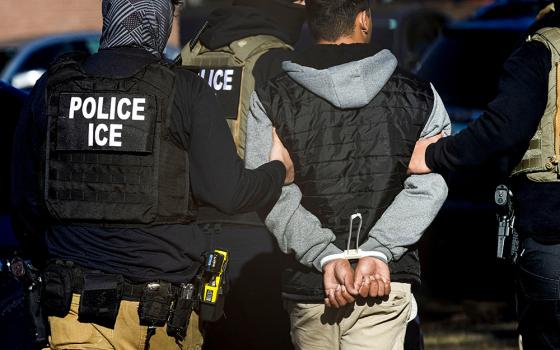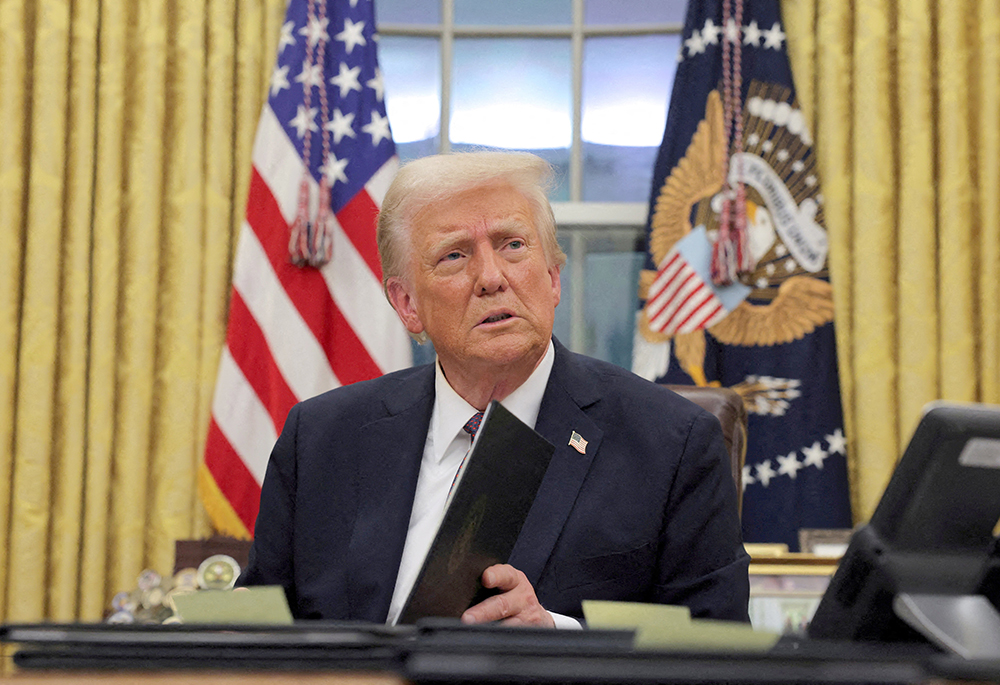
U.S. President Donald Trump signs documents in the Oval Office at the White House on Inauguration Day, Jan. 20 in Washington. He signed a series of executive orders including on immigration, birthright citizenship and climate. Trump also signed an order directing the U.S. government to only recognize two sexes, male and female. (OSV News/Reuters/Carlos Barria)
Catholic advocacy groups, southern border dioceses and the U.S. Conference of Catholic Bishops are expressing deep concern after President Donald Trump signed a series of executive orders targeting immigration on his first week in the Oval Office.
Particularly troubling to these groups are his actions tied to the declaration of a national emergency at the southern border and his attempt to end birthright citizenship, a right long upheld under the 14th Amendment of the Constitution to anyone born on American soil, regardless of their parents' immigration status.
Federal immigration authorities also will now be allowed to conduct enforcement actions in traditionally protected areas, including churches and schools, marking a sharp departure from previous policies, according to a Jan. 21 statement by the Department of Homeland Security, which said the move empowers agents to make arrests without restrictions tied to "so-called 'sensitive' areas."
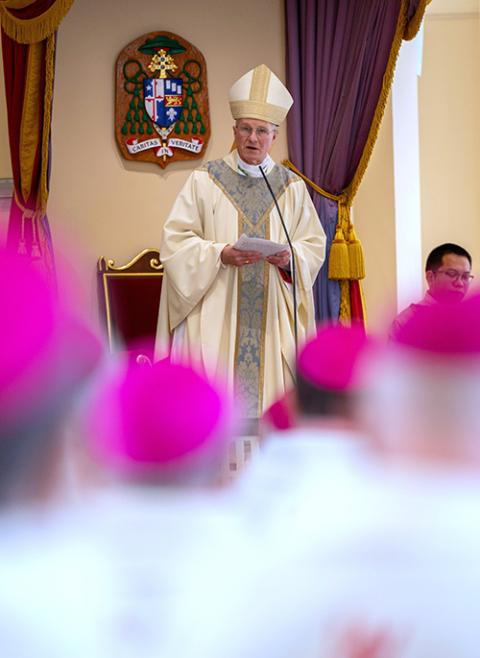
Archbishop Timothy Broglio of the U.S. Archdiocese for the Military Services, president of the U.S. bishops' conference, delivers a homily to fellow bishops at the opening Mass of the conference's fall plenary assembly Nov. 11, 2024, in Baltimore. (OSV News/Catholic Review/Kevin J. Parks)
"Some provisions contained in the Executive Orders, such as those focused on the treatment of immigrants and refugees, foreign aid, expansion of the death penalty, and the environment, are deeply troubling and will have negative consequences, many of which will harm the most vulnerable among us," said Archbishop Timothy Broglio, president of the U.S. bishops' conference.
Broglio in a statement praised Trump for his other executive order that states there will be only two sexes, male and female, under federal law. He also reiterated that the Catholic Church and the bishops' conference are not aligned with any political party.
Bishop Mark Seitz of El Paso criticized Trump's executive orders on immigration, describing them as measures that "deeply affect our local community and raise urgent moral and human concerns."
Seitz, whose Texas diocese is on the U.S.-Mexico border, denounced the Department of Homeland Security's decision to permit immigration raids in schools and churches, stating that it "strikes fear into the heart of our community, cynically layering a blanket of anxiety on families when they are worshiping God, seeking healthcare, and dropping off and picking up children at school."
The El Paso bishop also condemned the reinstatement of the Remain in Mexico policy and the "indiscriminate" closure of the border to asylum-seekers, describing the actions as "violating due process and restricting the few legal options available to the most vulnerable who knock on our door seeking compassion and aid."
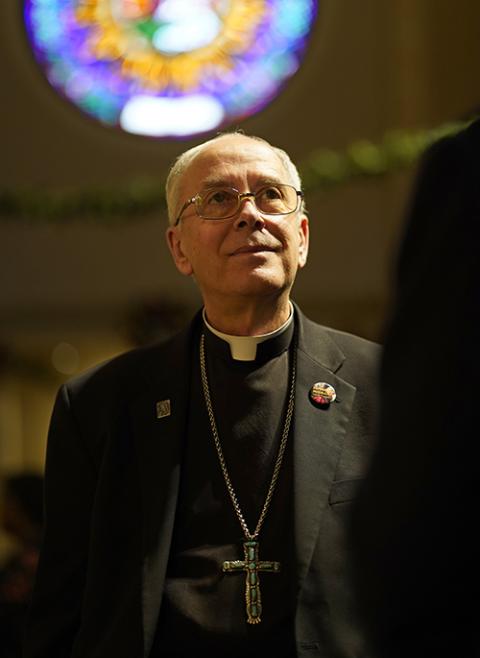
Bishop Mark Seitz of El Paso, Texas, is seen at St. Lucy's Church in Newark, New Jersey, Jan. 13 during an interfaith gathering of religious leaders committed to supporting immigrants facing the threat of mass deportation by the incoming Trump administration. (OSV News/Gregory A. Shemitz)
"Whatever your faith and wherever you come from, we make your anxieties and fears at this moment our own," Seitz said, speaking directly to immigrants at the border. "We stand with you in this moment of family and personal crisis and pledge to you our solidarity, trusting that the Lord, Jesus Christ, will bring about good even from this moment of pain."
The Diocese of El Paso said it will respond to Trump's new policies by educating immigrants on their rights, providing legal services and offering humanitarian aid. The diocese also said it is preparing to deliver additional aid to migrants stranded in Ciudad Juárez, across the Mexican border from El Paso.
Trump's immigration crackdown also includes dismantling programs established under President Biden. The CBP One app, which allowed migrants to book legal asylum appointments at the U.S.-Mexico border, was abruptly terminated, leaving tens of thousands of migrants stranded.
Archbishop John Wester of Santa Fe, New Mexico, called for comprehensive reform that balances compassion for immigrants with the concerns of American citizens.
"The United States owes much to immigrants," Wester said. The archbishop said he rejected mass deportation and "overly simplistic" solutions such as open or sealed borders. Citing his Catholic faith, the archbishop emphasized the inherent dignity of every person, urging leaders to approach the issue with wisdom and humanity.
"The heart of this complex issue lies in the fact that it concerns human beings, each created in the image of God with inherent dignity. We must not treat them as mere pawns in a game of chess nor politicize them," Wester said.
The archbishop highlighted the plight of immigrants fleeing violence and injustice, recounting a family in Tegucigalpa whose home was targeted by gangs. He also challenged misconceptions about immigrants, noting their positive impact on the economy and lower crime rates compared to native-born citizens.
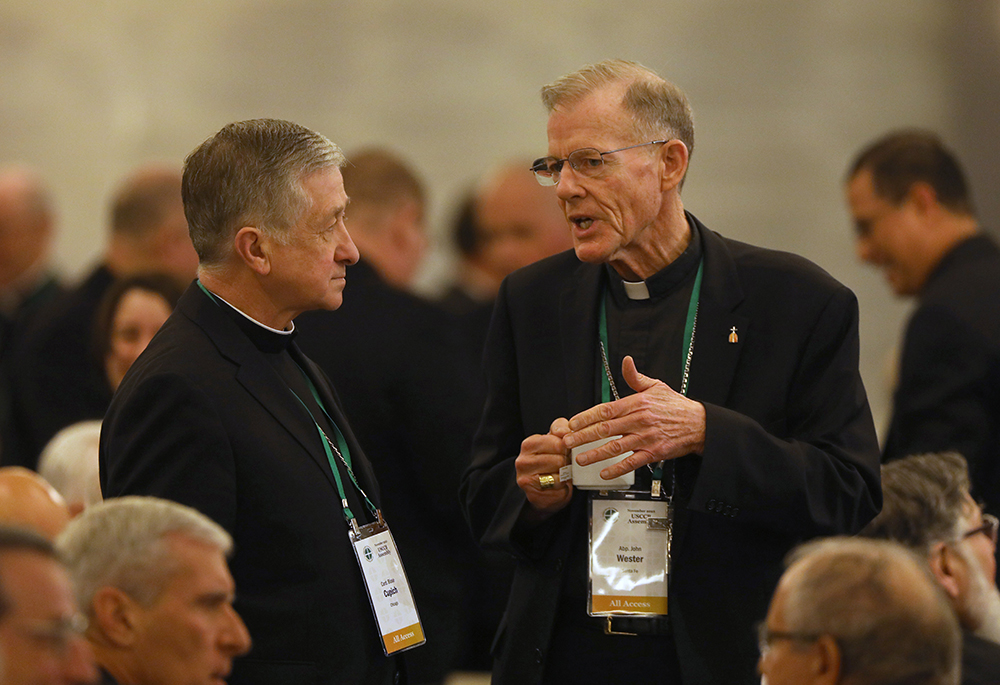
Cardinal Blase Cupich of Chicago, and Archbishop John Wester of Santa Fe, New Mexico, speak during a break at a Nov. 15, 2023, session of the fall general assembly of the U.S. Conference of Catholic Bishops in Baltimore. (OSV News/Bob Roller)
Trump also revoked a Biden-era initiative allowing monthly entry for migrants from Cuba, Haiti, Nicaragua, and Venezuela, and ordered that Mexican drug cartels be designated as foreign terrorist organizations. "I have no higher responsibility than to defend our country from threats and invasions," Trump said on Jan. 20.
Immigration advocates warn these measures could destabilize vulnerable communities and fracture families nationwide.
The Catholic Legal Immigration Network condemned the executive orders, describing them as a threat to foundational American values and Catholic principles. The orders are "a direct affront to the long-standing values of our nation," said Anna Gallagher, the network's executive director.
"These dehumanizing executive orders contradict our core values of compassion, justice and the biblical mandate to welcome the stranger. They threaten the very fabric of our society."
Advertisement
The Catholic immigration group warned that the policies risk creating a "permanent underclass of stateless individuals" and fail to uphold the U.S.'s moral and legal obligations to those fleeing violence and persecution. "Now, more than ever, we must come together as people of faith and conscience to resist policies that marginalize and dehumanize our immigrant brothers and sisters," said Gallagher.
Jesuit Refugee Services, which serves over a million refugees in 58 countries annually, offering education, health care, and advocacy services, expressed hope for collaborative efforts to aid refugees and displaced individuals.
"People have a right to seek protection in another country if they have been persecuted or fear persecution on account of religion, race, nationality, political opinion, or membership in a particular social group," the Jesuit group said.
The Jesuit organization warned that without U.S. leadership, "adversaries who undermine democratic principles like freedom and justice … will come to dominate" areas where displaced families lack hope.




